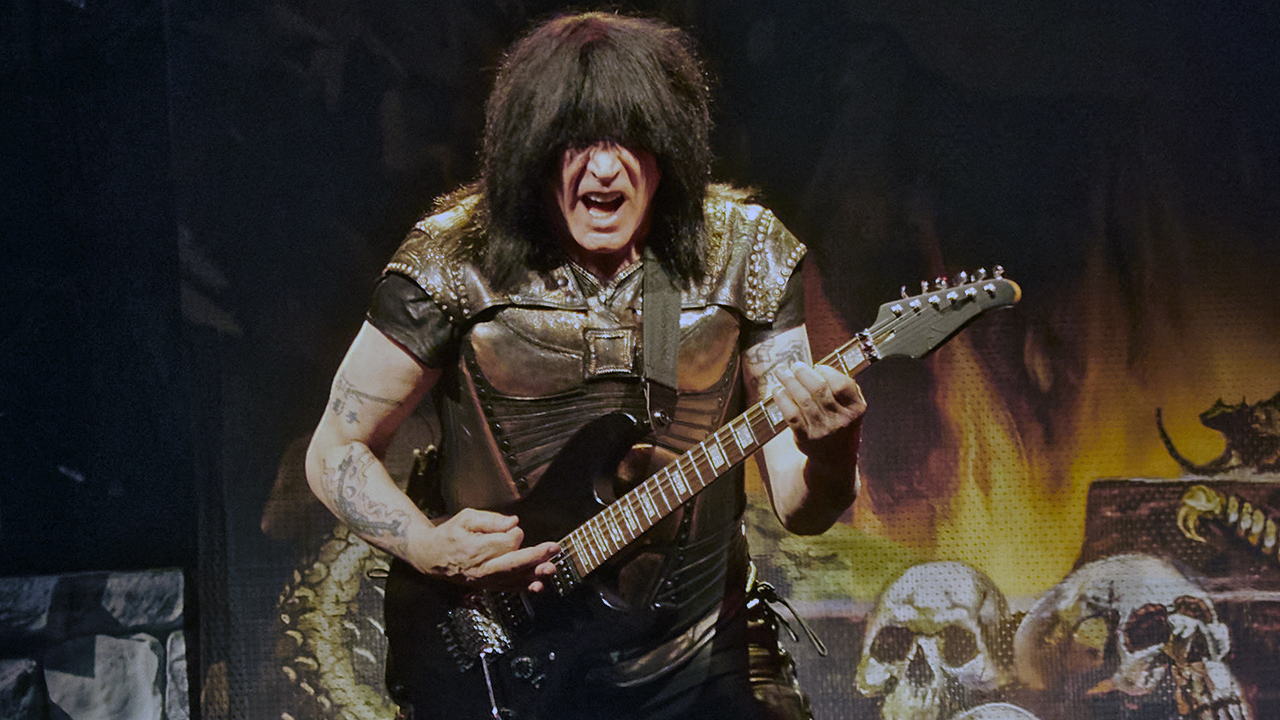John Reis details his approach to guitar playing: “Rules are important – you need to know how to do something in order to know how to f**k with it”
The Hot Snakes guitarist on why he dubs new supergroup PLOSIVS' upcoming self-titled debut “distance rock”, how he recovered his stolen gold sparkle Gibson Les Paul Custom, and his latest solo outing, Ride the Wild Night
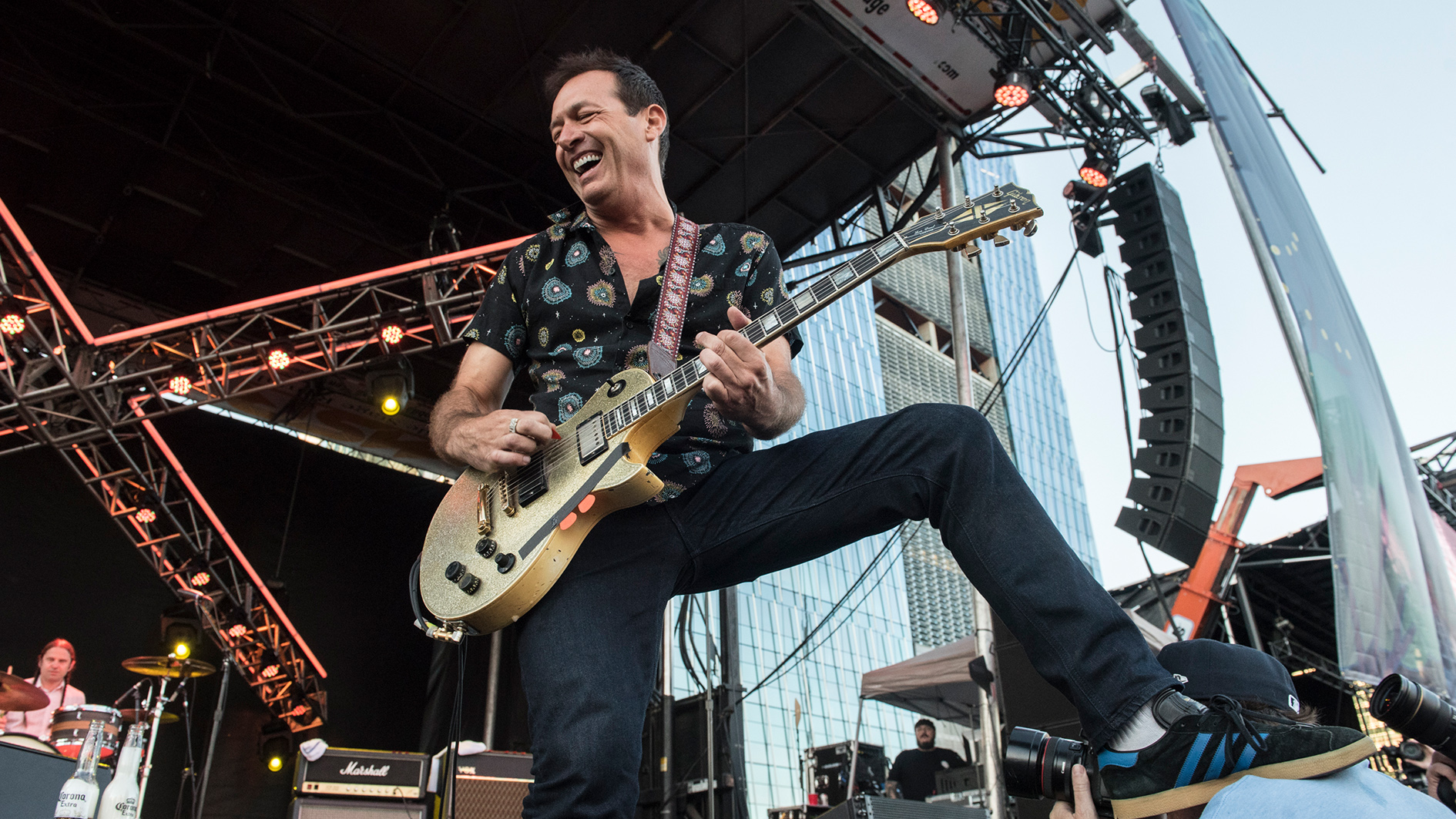
All the latest guitar news, interviews, lessons, reviews, deals and more, direct to your inbox!
You are now subscribed
Your newsletter sign-up was successful
You wouldn’t think a middle school benefit concert would be a breeding ground for veteran post-punk activity, but a SoCal student fundraiser is exactly where PLOSIVS – the supergroup co-anchored by Hot Snakes guitarist John Reis and Pinback vocalist-guitarist Rob Crow – premiered the songs from their self-titled debut.
Speaking with Guitar World, Reis explains that while he and Crow have orbited around each other in San Diego’s punk scene for 30-plus years, it wasn’t until they kept running in to each other while dropping off their kids that they truly considered joining forces. Their live debut – which technically preceded both their band name and their current line-up – was apparently an A+.
A quick study of the group – now including Reis’s former Rocket from the Crypt bandmate Atom Willard on drums and Mrs Magician’s Jordan Clark on bass – reveals a prolific and high-caliber collective history.
Take Hit the Breaks, a tempo-jolted fusion of Crow’s melody-forward songbirding, Pinback’s quirked-up meter shifting, and the hot-rodded snarl of Reis’s right hand. “The sound is very literal,” Reis confesses of cross-pollinating their lineages through PLOSIVS.
Reis has dubbed the album “distance rock,” a nod to tracking the record during the pandemic. While each player had been living in Southern California when they’d hit the studio in October of 2020 (Willard now resides in Nashville, Tennessee), the quick, masked-up session marked the first time the current line-up had been ever played in a room together; Reis and Crow added vocals and guitar overdubs from their respective home setups.
While the debut album isn’t due until March 17, PLOSIVS already laid down the beds for a follow-up at the No Fun Club studio in Canada. The late 2021 sessions were markedly different, with the band hunkering down together for a couple of weeks in Winnipeg.
It all makes for a particularly prolific period for Reis, who has also just released a debut solo album as Swami John Reis. Naturally, Ride the Wild Night plays with the punk polemics coursing through his DNA (see I Hate My Neighbours in the Yellow House), but the record also bolsters Pabst-smashing blues and a newfound acoustic lean he likens to his love of the Kinks and the Flamin' Groovies.
All the latest guitar news, interviews, lessons, reviews, deals and more, direct to your inbox!
Though Reis picked up the fundamentals of the punk-rock playbook years ago, it also pays to stray from the lesson plan.
“I think rules are fun to play around with, like haiku or even the rock ‘n’ roll, verse-chorus-verse-chorus-bridge – whatever the pop format may be. You need to know how to do it in order to know how to fuck with it.”
Speaking with Guitar World, Reis further dove into the Brit-styled bite of his new favorite amp, and the way he’s happily pissing all over one of PLOSIVS’ most harmonious moments.
PLOSIVS brings you back together with Atom on drums, but there’s also a traceable history between yourself and Rob in that he sang on Drive Like Jehu’s Luau, off [1994’s] Yank Crime. Outside of that, had you played with Rob much before starting PLOSIVS?
Reis: “I’d never jammed with Rob before this. I don’t even know if we were really friends, in the sense that we’d never spent a lot of time together. But over the years we’ve been in the same place at the same time. And with our kids going to school together, it was always great seeing him in the mornings, or in the afternoon when we’re picking up the kids.
“I really jumped at the chance to play with Rob. Obviously he knows I’m a big fan of the bands that he was in; and then there is the connection with him singing on Luau. I knew how prolific he was, but it wasn’t until I actually played with him that I really felt the depth of his creativity. He’s just able to turn on a dime and create. He’s hard to keep up with, in the best possible sense. He keeps me on my toes.
“My contributions to the PLOSIVS record were the product of maybe a year-and-a-half of writing songs; he tends to write much faster and is able to work in different modes simultaneously. I hit one mode and exhaust that before I turn the page, you know?
“I don’t know if it’s taboo to even mention this, but some of these songs were written with Hot Snakes in mind – but Hot Snakes is a band with someone in Philadelphia, one of the members in New York, and one member in San Diego that was really affected heavily by the pandemic. Hot Snakes [couldn’t] make a record the way PLOSIVS made a record. It’s not the way the band operates.”
I think of guitar chords and song arrangements in terms of shapes. Hit the Breaks seems like a circle – it has this cyclical kind of thing where it falls back upon itself and then starts all over again
You’d hinted at yours and Rob’s respective writing styles, but in raw terms of your tone and approach to guitar, how do you fare together?
“When I hear the record, it sounds exactly like Rob singing and playing guitar along with some of the guitar moves that I do. And with his songs that he brings in, I hear it as me contributing my style to the music of Rob Crow. The sound is very literal. It is what it is!”
Is Hit The Breaks, PLOSIVS’ first single, a Rob song?
“Yep.”
There’s an irregular hop to how the chords get split in the verse – it sounds straightforward but I also get lost with how it plays with the meter…
“That was one of the first demos that Rob sent me. I thought it was immediately catchy, an earworm that drilled itself into my head and lived there for a while. I don’t want to speak for Rob, but I know I think of guitar chords and song arrangements in terms of shapes. That one seems like a circle – it has this cyclical kind of thing where it falls back upon itself and then starts all over again.
“It’s difficult to learn Rob’s songs. It’s a challenge, but that’s what makes it fun. Like, ’Fuck… this is hard!’”
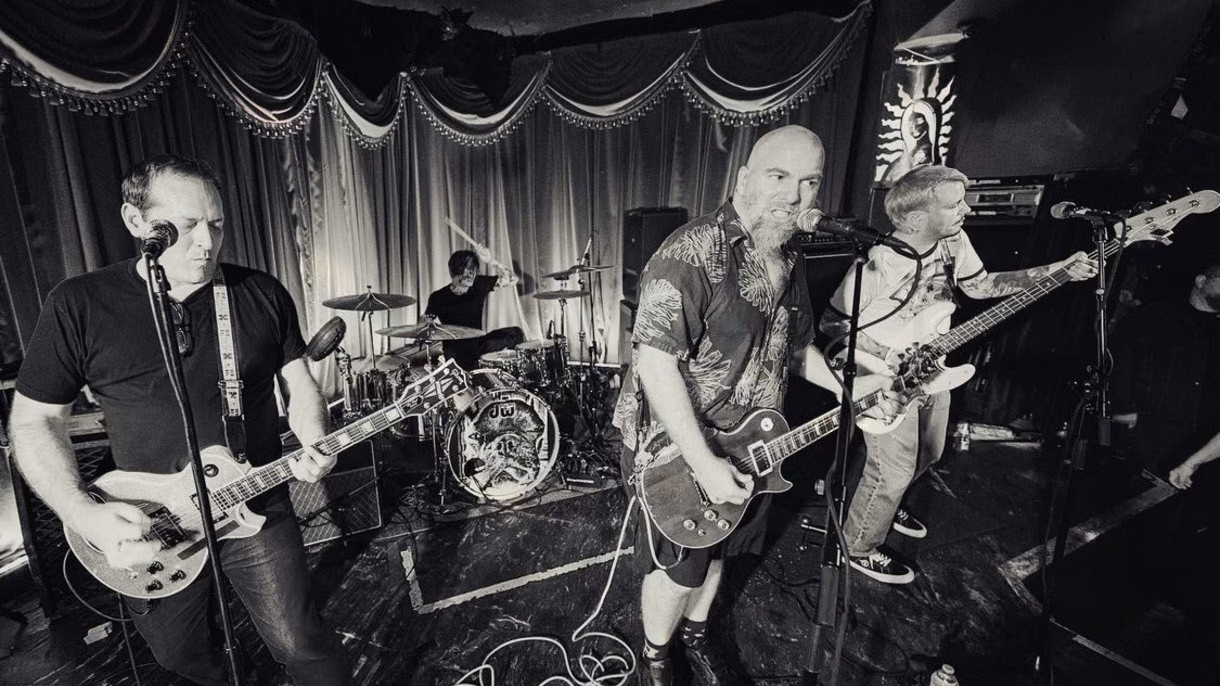
The chromatic swing to the opening riff on Rose Waterfall feels like a classic John Reis groove. Then the solo gets a little out of control with those big bends…
“The song is very pretty; it has a beautiful vocal melody. The chorus is supposed to open up pretty wide, but the solo in the middle brings it back to a monophonic thing. It was supposed to be a disrespectful sound, just pissing on the mix and the song in a way that I think is funny. It kind of comes out of nowhere.”
Were you working with a similar set-up to what you would use on a Hot Snakes record?
“Similar, but different, too. My friend Brian managed Hot Snakes on a UK tour, [and he] supplied a backline there. He brought out this 100-watt Carlsbro amp that I really fell in love with it. It’s fucking loud, but clean and responsive.
I’m always messing with the guitar. I had my pickups each wired to independent jacks – there’s two inputs in the guitar. Each pickup goes to a different amp
“It’s not a very forgiving amp. If you don’t fret something correctly, or don’t let it sustain, or you’re bending a bit, it reveals everything. It forces you to play with a bit more finesse, which isn’t necessarily the way I play.
“I found one on Reverb; someone had one in New Orleans. I let Rob use it and he fell in love with the amp as well, so then he purchased one. We were using these dual Carlsbro TC100 amps. They’re beautiful amps, so cool-looking.
“They look very ‘70s, [with] a lot of the same electronics that are in a lot of really desirable vintage amps – Partridge transformers, and whatnot. I think it sounds similar to 100-watt Sound City amp, but it has more of that British top end clarity that you get from a HiWatt, or something like that.
“I also love vintage Vox amps, so I still used a ‘64 Vox and a ‘67 in tandem with the Carlsbro. I think Rob used his Mega/Boogie – I forget what it is, but it’s the same amp he’s used on pretty much everything. That’s basically the [amp] setup. I used the same guitar as I do in Hot Snakes and Rocket; he has one Les Paul that he also uses in Pinback.”
For you, was that the gold sparkle Les Paul with the Marlin sticker on it? How long have you had that?
“I probably bought it in ’91. I had this Les Paul Custom that I used to play in Drive Like Jehu and Rocket, and this band Pitchfork that I’d been in before that, and the neck had busted.
“Not knowing how easy it would be to repair it, I took it to somebody and then went and bought another guitar, thinking that [Custom] was mostly likely ruined. It wasn’t the first time I played it, but I remember going to Japan with [the gold sparkle Les Paul]. I think that was ’92, so I’ve had it for a while.”
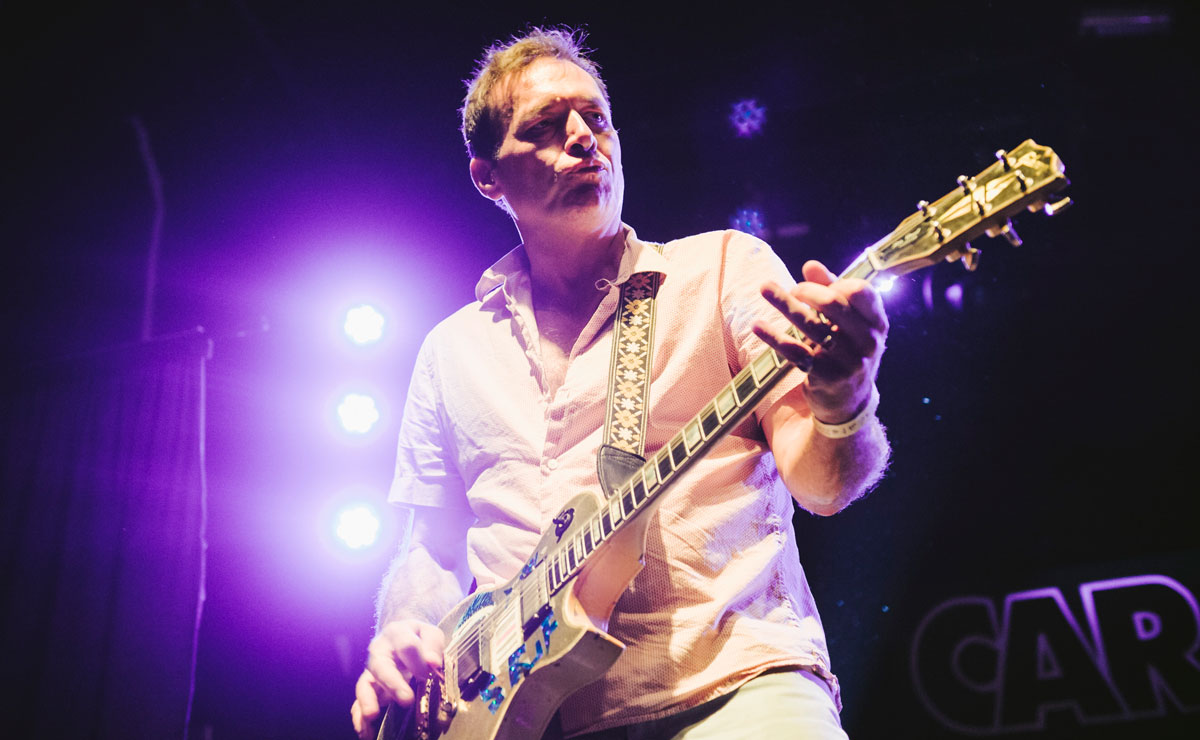
That guitar had been stolen a few years back. How did you end up finding it again? And what condition was it in?
“Yeah, my guitar was stolen out of my car while we were recording the last Hot Snakes record [2018’s Jericho Sirens]. I was probably about 15 feet away from my car when it was swiped.
“A friend of mine who scours the internet for vintage gear found it listed on OfferUp and contacted me. I had already filed a police report and immediately contacted the police once it turned up, but they claimed there was nothing they could do, so unfortunately pursuing it through legal channels proved to be useless.
“Some friends and I made arrangements with the criminals to purchase it, and we took it back. The condition was fine. They removed my sailfish decal on the front of the guitar, probably cleaned it for hours…
“I was very relieved to get it back. A couple months later when we were playing in DC, G.L. [Jaguar] from Priests gifted me a really cool marlin decal to replace my sailfish one – such a kind gesture. I immediately slapped it on, and so it goes…”
Have you made any modifications to that Les Paul over the years, whether before or after the theft?
“I’m always messing with the guitar. I had my pickups each wired to independent jacks – [there’s] two inputs in the guitar. Each pickup goes to a different amp.
“In Hot Snakes, I rely mostly on the neck pickup; the neck preferably goes to one of my vintage [Vox] AC30s. The bridge pickup preferably goes to a [Marshall] JCM800 or something similar that is a bit more midrange-y, maybe a bit more gain, and has a master volume so I can match the output of the amps.
“Recently, I had the extra input taken out; it’s wired traditionally for PLOSIVS. I can always put it back once Hot Snakes start playing out again, if I decide to… [but] I’m kind of digging the simplicity right now.”
2022 is shaping up to be a big one – you’ve got this PLOSIVS record coming out soon, and the band had also revealed that there’s another one in the tank…
“It’s not ready yet. We went and we recorded up in Winnipeg, though.”
Heading to Winnipeg in the dead of winter seems like a strange choice.
“It was a strange choice, but it was an opportunity that we couldn’t refuse. Basically, a friend of a friend of Rob’s had designed this studio up in Winnipeg called No Fun Club. It’s a state-of-the-art facility loaded with some of the most desirable vintage analog equipment you could really have. It’s a bit of a temple.
“Part of the agreement was that once the studio was functioning, he would be able to bring some bands up there and record them for free to bring awareness to this place. So we jumped at the chance.
“I think because the first record we made was so, you know, distance rock, and [was] very much a collaboration in isolation, I think we just decided, ‘Well, here’s a studio where we can go up and record live; there’s isolation, we can all be in the same room together with our amps and drum kit.’
I’m not in a huge hurry to release our second record because, you know, our first record’s not even out yet
“And we also liked the idea that we could write some stuff and be spontaneous. We recorded the basic tracks; that’s where we’re at with it. It’s in Rob’s hands right now, and he’s working on the vocals.
“Hopefully we’ll finish it up in the next couple months and we’ll have another record. I’m not in a huge hurry because, you know, our first record’s not even out yet… but it might be out by the end of this year. We’ll have to see.”
You’ve also got your Ride the Wild Night solo album this year. You’ve billed records under your name before – like the collaborative single you’d made with METZ and the instrumental surf album you’d done with The Blind Shake – but how did you get to the point where you officially wanted to go solo?
“I was always a bit jealous of friends in bands that were more or less considered a solo endeavor, who were able to change out band members throughout the years. And as I’m getting older, time is harder to come by. It’s easy to find people to create with, but it’s not always easy to find someone who can get in a van and go out and do shows.
“I’m playing bass on the record. I’m playing the guitars, some of the synthesizer, and some percussion stuff – tambourines and cowbells – but for the most part I’m still very much relying on the help and input of my friends in order to make this band possible.
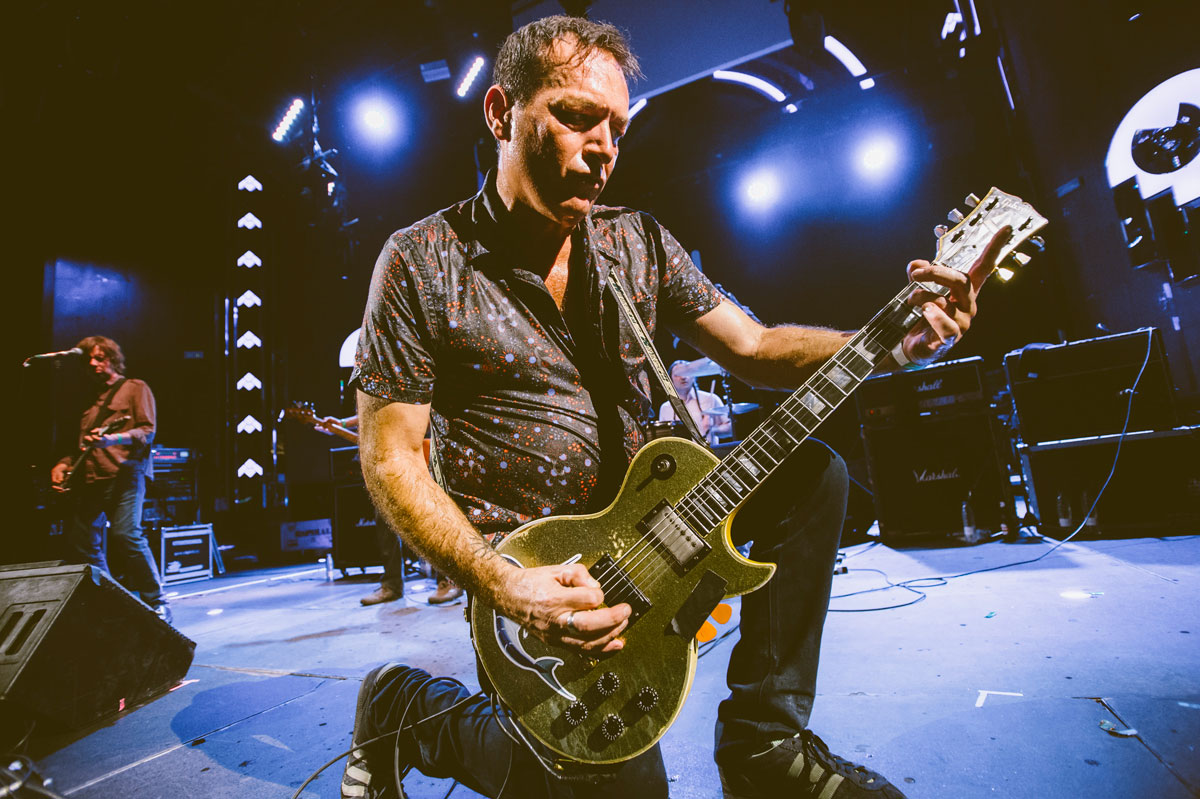
“Jason [Kourkounis], who plays in Hot Snakes and Night Marchers, drums on most of the record; my friend Chris Prescott, who’s played Pinback and has filled in for Rocket, he plays drums on a song. There’s [Hot Snakes bassist] Gar Wood singing on it; my friend Jacob [Turnbloom] from Mrs Magician sings on it; Jordan from PLOSIVS sings on quite a bit of it. It’s just a lot of people!
“Also, the sound is centered on acoustic guitar and acoustic piano, [the latter of] which our friend Joey [Guevara] plays. He’s on pretty much the whole record. That’s a big influence on the way the record sounds, and the way that the songs were arranged.”
Outside of drums, Ride the Wild Night’s opening title track begins with the sounds of acoustic guitars; the swing to We Broke the News is anchored around those acoustic strums, too. How did you want to develop that side of your playing?
“Whenever I would use an acoustic guitar [in the past], it was always in conjunction with the electric guitar; it always translated as more of a texture. A lot of times it gets buried, and all you hear is the attack – sometimes it just sounds like a washboard, this percussive scratching underneath the electric guitars. I knew I didn’t want this [record] to be that.
I think with any new band or creative endeavor, it is boundary-less in the beginning. It isn’t until there’s a bit of definition in the identity where you start getting into a thing where it’s like, ‘OK, this is what it is
“I really like that folk-punk sound of the ‘60s. Bands like the Kinks or the Flamin' Groovies, they used quite a bit of acoustic guitar on songs. It seemed like something that’s always been an influence, but I wanted to give it a more literal place in the songwriting and recording.”
Ride the Wild Night features a wide scope of music – Vape In the Dark Alone homes in on that fired up, punky drive of Hot Snakes, but a song like Rip from the Bone feels like a roadhouse blues. Did making a solo album feel boundary-less, compared to working on a group project?
“I think with any new band or creative endeavor, it is boundary-less in the beginning. It isn’t until there’s a bit of definition in the identity where you start getting into a thing where it’s like, ‘OK, this is what it is.’
“With Hot Snakes, when we started recording the [first] record [2000’s Automatic Midnight], that sound didn’t exist yet. So when we went into the studio blind we were making things up; we didn’t have any parameters. [We weren’t] using bass, just these ‘60s wheezing organs, with the low-end that they produce replacing the bass.
“We knew we wanted the drums to be big and roomy, but we were really into bands like the Gories that would tape a tambourine to the floor tom, and kind of used that as an instrument. So we were inspired by some of the bands and sounds that we liked, but it was kind of like, ‘It’s going to be a bit more drama and tension; it’s not going to be as traditional.’
“By the fourth record, or whatever, [Hot Snakes] has a sound. This is what it sounds like when these people play together.
“It did seem like there were no boundaries for the solo album, but that’s common. That’s the way a first record should feel. Maybe this is something that’s easier to do when you’re calling it a solo record, to keep those boundaries at bay.
“[But] I also think there should be rules. I think rules are fun to play around with. Like haiku, or even the rock ‘n’ roll, verse-chorus-verse-chorus-bridge – whatever the pop format may be. You need to know how to do it in order to know how to fuck with it. There is something very liberating about not knowing how something is going to turn out before you start it, because you’re kind of going into the wilderness.”
- PLOSIVS' self-titled debut album arrives March 17 via Swami Records.
Gregory Adams is a Vancouver-based arts reporter. From metal legends to emerging pop icons to the best of the basement circuit, he’s interviewed musicians across countless genres for nearly two decades, most recently with Guitar World, Bass Player, Revolver, and more – as well as through his independent newsletter, Gut Feeling. This all still blows his mind. He’s a guitar player, generally bouncing hardcore riffs off his ’52 Tele reissue and a dinged-up SG.

